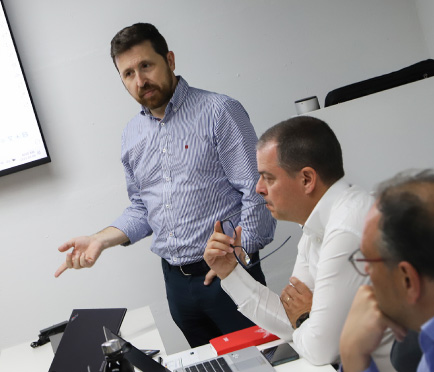The answer is: yes, more than ever! Let’s delve into what management software is, the main types, how to implement it, and why it remains an essential tool for business growth in 2025.
Management software is a crucial component for success in modern business management—even in 2025. In the current landscape, there are increasingly more innovations, types of software, methodologies, and tools available, but ERP software—as management software is also known—continues to be an essential tool for companies, regardless of their size or industry.
A good management software is, in fact, a constantly evolving work tool, integrating technologies such as Artificial Intelligence, automation, and Business Analytics to bring even more efficiency and increase user productivity.
In this article, you’ll better understand what management software is, the main types, the advantages of its use, and how to select the most suitable ERP for your company.
What is Management Software?
By definition, management software is a computer program developed to centralize all information related to the management of an organization. It is a tool that gathers information that is usually scattered and inaccessible, facilitating and speeding up decision-making, automating processes, among various other advantages—which we will see later.
Management software can be classified in two ways: horizontal and vertical. A horizontal management software is a more comprehensive solution, consisting of modules that generally correspond to the different departments within a company, ranging from finance, human resources, sales, marketing, logistics, among others. It is an agnostic solution; that is, it addresses common needs of companies in different sectors.
A vertical management software is developed considering the specificities of a sector or industry, and therefore includes modules and functionalities that meet the needs of that sector, being much more specialized. Some of the main software in this category are o software for Industry (MRP and MES), software for logistics and warehouse management (WMS), software for the healthcare sector, among others.
It is important to note, however, that regardless of whether the software is vertical or horizontal, a characteristic that cannot be missing is the customization capability. Nowadays, just like organizations, ERP software is also constantly evolving, as whenever there are changes in business (new markets, products, updated legislation, or other specificities inherent to the sector or the company itself), the software must also reflect these changes.
This is what makes each organization have a unique and unrepeatable ERP—and all thanks to implementation teams like those at PONTUAL, who customize the base software solutions according to the specific requirements of each client.
On the other hand, as mentioned at the beginning of the article, the evolution of technology is also at the service of ERP, making it an increasingly complex tool while allowing for more innovation and agility in operational business management. Today, technologies such as artificial intelligence, IoT (Internet of Things) and others are already integrated into management software, bringing more benefits to its users.
Management Software Trends for 2025
As we have seen, management software is not a static tool. As technology develops, software houses are refining their ERPs to bring more innovation to the market and keep their products updated with new features.
These are some of the main management software trends for 2025:
Artificial Intelligence (AI) and Machine Learning: AI will continue to play a crucial role in the evolution of ERP software, particularly in process automation, predictive analysis, anomaly detection, and even customer service.
Cloud: At a time when remote and decentralized access to platforms is increasingly a necessity for companies, the cloud offers more flexibility, security, reliability in accessing management software, and reduced costs—among other advantages.
System and software integration: With the adoption of more and more technological solutions by companies—including sector-specific management software, e-commerce solutions, among other systems—integration will be one of the major management software trends in 2025, allowing businesses to centralize their operations, eliminate discrepancies or delays, and streamline daily tasks.
Internet of Things (IoT): Companies in sectors such as industry and logistics increasingly tend to leverage the benefits of IoT (Internet of Things), especially when connected to software like ERP. This integration enables inventory monitoring and equipment tracking, and the use of sensors and devices becomes a great aid in preventive maintenance management.
Improved user experience and interfaces: It was one of the main management software trends in 2024 and promises to remain relevant in 2025. UX (User Experience) aims at user interaction with a software platform, encompassing design, usability, and satisfaction—and improving this experience is currently a major focus for ERP providers.
Sustainability and ESG: Being increasingly a priority for companies, ESG (Environment, Social and Governance) is also a trend that will gain prominence in management software, which will function as a support tool for implementing sustainability policies, corporate governance, and social initiatives.
Types of Management Software
In addition to being distinguished between vertical and horizontal software, management software can also be classified into different typologies, considering the functionalities they include. These are some of the most common types:
- ERP (Enterprise Resource Planning): This is horizontal management software that includes areas common to different sectors: finance, human resources, sales, purchasing, stock, among others. The acronym ERP is used synonymously with management software.
- CRM (Customer Relationship Manager): As the name suggests, CRM software centralizes all processes related to customer relationship management and includes functionalities such as sales pipeline management (from leads to closing deals), marketing process automation, among others.
- Billing and Accounting Software: Covers all tasks related to financial management, including accounting, expense control, invoice issuance, and tax reporting.
- Project Management Software: Designed for project managers and team collaboration, it assists in defining, planning, executing, and monitoring projects.
- Production Management: Management software for industry, which is subdivided into two types: MRP (Material Requirements Planning) and MES (Manufacturing Execution System). MRP essentially deals with material management, ensuring there is no excess or shortage of raw materials, thus optimizing production. MES controls shop floor activities in real-time through data terminals from equipment and labor, providing greater visibility into the production process.
- Stock and Logistics Management: Logistics software gathers functionalities related to controlling the flow of goods from entry to exit, optimizing warehouse management and stocks. It can also encompass logistical processes such as transportation, storage, and distribution of products.
- Document Management: Centralizes all document management of organizations, from creation to organization, sharing, access control, among others. Also known as Digital Archive, it has played an important role in the transition from paper to digital in businesses of all sizes.
- Business Intelligence (BI): Often part of management software as a module, rather than an independent software, BI tools allow data analysis from reports or visual elements that present information more intelligibly and provide valuable insights for strategic decision-making.
Advantages of Using Management Software
Having a tool that centralizes access to all processes of an organization is, in itself, an undeniable advantage of management software. But there are many more—let’s look at some.
- Greater Operational Efficiency
With management software, you will automate routine processes and tasks, reducing the likelihood of errors and the time needed to complete them, increasing operational efficiency.
- More accurate decision-making
Updated in real-time, the data feeding the ERP system generates valuable information that allows for faster and more informed decision-making, empowering managers.
- Better financial management
By centralizing data in one place, management software promotes simplified access to information regarding budgets, payments, invoices, and others, promoting greater financial sustainability for the business.
- More integrated processes
By integrating different areas and processes of an organization, such as sales, finance, stocks, HR, and others, ERP provides the user with a global view of operations and facilitates collaboration and information sharing between departments.
- Adaptation to Change
In a constantly changing business context, management software allows for more agile adaptation to changes (internal or market-related), and is also periodically updated in cases of new legislation.
- Information always secure
Software providers invest in technology that ensures the security and integrity of ERP data against cyberattacks.
- Uncomplicated remote work
With the advent of cloud management software, it is possible to access the tool from anywhere and at any time, as long as there is an internet connection.
- High customization capability
A good ERP software has a highly customizable framework, always subject to customizations that allow for a more complete response to business needs. This is what makes no ERP the same as another.
Alongside customization, it is worth noting that, nowadays, management software is increasingly a central piece in a complete puzzle of systems and technological solutions that must communicate with each other to generate more efficiency and seamless operations. Let’s see, then, what software integration is and why it is so important for today’s businesses.
Software Integration from ERP
When we talk about the customization capability of management software, we are not just talking about the possibility of adding new modules or even custom-developed functionalities.
More and more organizations rely on various software and add-ons that, if only functioning independently, without cross-referencing data, can undermine the great strengths of technology—process optimization, task automation, lower effort and error rate.
Software integration from ERP refers to the connectivity and interoperability between various systems of an organization, leading to the creation of a true technological ecosystem where automatic data exchange exists and allows users a more integrated view of operations.
An Example of System Integration
Imagine, for example, that you have an e-commerce and already use an ERP, both in isolation. Integrating these two distinct systems will allow you to include information about sales, stock, among other aspects, from the online sales channel into the management software—without the need for manual data entry, reducing the likelihood of errors and the time spent on this task.
Integrating ERP with other software or applications makes it simpler to access information, providing a better user experience and data analysis. All this leads to more efficient and integrated management. Additionally, it allows for faster responses to the demands of your industry, sending a clear signal to the market of competitiveness and technological innovation.
System integration is a personalized service that takes into account the software used in organizations, with no standard set of solutions. PONTUAL has specialized teams and can help you implement a software and systems integration project—contact us.
How to Choose the Right Management Software for your Company
Given the complexity and great diversity of solutions available in the market, choosing the management software that best suits your business needs may not be the simplest task. On the other hand, an ERP is not like a simple computer program that is installed one day and ready to use the next. Implementation processes consist of distinct phases, ranging from consulting to software design and customization, testing, implementation, training, among others.
The good news is that there are some steps you can take to start better understanding the management software market and the solutions that may best suit your case—like the ones we present to you below.
1. Assess your Company’s Needs
Before you start researching the solutions available in the market, you should look “inside”—analyze processes and workflows, areas with room for improvement, and what types of functionalities could help increase productivity and efficiency in your company. Don’t worry if there are already software solutions for what you need; take note of your needs, and the right software implementation partner will be able to understand how these translate into technological terms.
2. Analyze the Available Software in the Market
Conduct an online search for the main management software available in the market. Compare functionalities, the strengths of each brand, and which might be the solution that best fits your needs. You don’t have to decide alone—a partner like PONTUAL has teams of consultants capable of identifying the best option for you from a vast portfolio of solutions.
3. Establish your Budget
Now that you know more about the solutions available in the market, set a budget considering not only the cost of software and implementation but also customization needs, technical support, and assistance.
Keep in mind that choosing based primarily on price can lead you to the wrong option; a management software might represent a higher initial investment, but in the medium/long term, you’ll find that the levels of operational efficiency, agility, and process optimization more than justify the investment.
4. Evaluate the Implementation Process
Once you have one or more proposals aligned with your budget, evaluate the main aspects of the implementation process—how long it will take and how it might impact your operations, whether training is included, what resources you will need, timings, among other aspects. Rely on your implementation partner to clarify all doubts and request demonstration sessions of the tool if necessary. Once you have considered all these aspects, you should be ready to make your decision.
As you can see in this brief guide, often, more than knowing which is the right tool, it is essential to be with the ERP implementation partner who can guide you towards a more informed and suitable decision for your organization.
More than just a software implementer, PONTUAL has teams of experienced technology consultants for businesses in sectors like your company.
From industry to logistics, from services to the HORECA channel, including Retail, Accounting and Legal sector — we have a vast portfolio of partners and proprietary management software solutions that have been improving the management of hundreds of businesses in the Iberian market for over 30 years.









